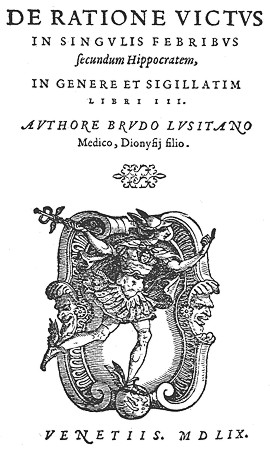Lessico
Manuel Brudo

Latinizzato in Brudus Lusitanus, in quanto di origine portoghese. Manuel Brudo, essendo ebreo e marrano (cioè, un ebreo o un musulmano convertito, solo in apparenza, alla fede cristiana) nel 1530 fuggì dal Portogallo. Scrisse De ratione victus in singulis febribus secundum Hippocratem, in genere et sigillatim libri III (Venetiis: per Ioannem Rubeum, 1559)
Médico
português(Séc. XVI). Era
filho de Dionísio, o qual foi físico e cirurgião do rei D. João III. Ambos
deixaram o país provavelmente por serem judeus ou cristãos-novos, fixando-se
em Antuérpia, cidade onde os encontrou Amato Lusitano![]() .
Brudo também exerceu clínica em Inglaterra. (www.uc.pt)
.
Brudo também exerceu clínica em Inglaterra. (www.uc.pt)
Desde entonces, médicos judíos aportarán conocimiento y experiencias a la Sublime Puerta, como es el caso de Manuel Brudo, llamado a veces Brudus Lusitanus (Brudo el Lusitano), un criptojudío portugués que escapó de Portugal en 1530 y que al llegar a Estambul pudo practicar el judaísmo con entera libertad. Moshé Hamón y Musa Yalinus al-Israili (Moisés, el Galeno judío) fueron dos eminentes médicos judíos que se destacaron en la época del sultán Soleimán el Magnífico. (www.alfinal.com)
The Jews in London had a very particular way of frying fish in batter and eating it cold which has become a classic of Jewish cooking in Britain. It was a legacy of the Portuguese Marranos (crypto-Jews) who came to England in the sixteenth century, many of them via Holland. Manuel Brudo, a Portuguese Marrano, wrote in 1544 that the favorite dish of Marrano refugees in England was fried fish. They sprinkled it with flour and dipped it in egg and in bread crumbs. Lady Judith Montefiore, the anonymous editor-author of the first Jewish cookbook in England (published in 1846) referred to the frying oil as "Florence oil," meaning olive oil. At that time an important community of Marranos in Livorno (where her husband came from) exported olive oil to England. (www.jhom.com)